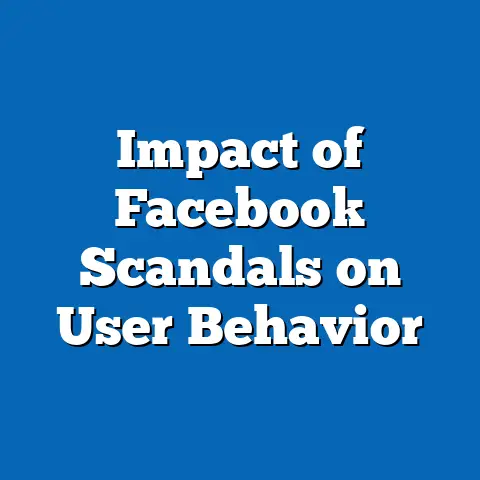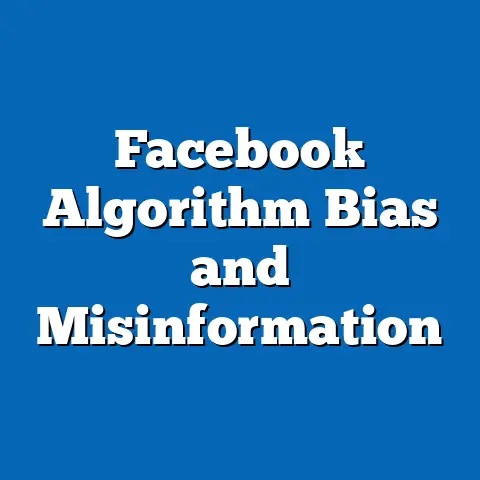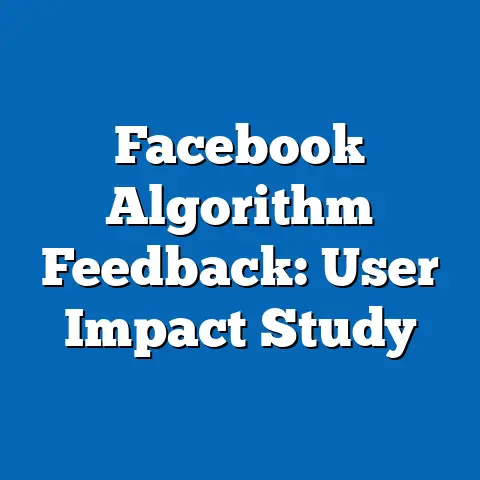User Control Awareness on Facebook by Region
In the early 2000s, the internet was a burgeoning frontier, and social media platforms like MySpace and Friendster offered a novel way to connect with friends, share music, and customize personal spaces online. For many, the launch of Facebook in 2004 marked a turning point—a digital scrapbook where memories were shared through status updates, photo albums, and wall posts, evoking a sense of nostalgia for simpler online interactions. This nostalgia for the early days of social media contrasts sharply with today’s complex landscape, where privacy concerns and user control have become central to the user experience.
Facebook, now Meta’s flagship platform, has grown from a college networking site into a global behemoth with over 3 billion monthly active users as of 2023 (Statista, 2023). Yet, with this growth comes scrutiny over data privacy, algorithmic bias, and the extent to which users understand and exercise control over their digital presence. This article explores user control awareness on Facebook across different regions in 2024, examining how historical context, cultural norms, technological access, and societal shifts influence users’ engagement with privacy settings and data management tools.
The analysis leverages nostalgia not only as a cultural touchstone but also as a lens to understand how past experiences with social media shape current attitudes toward user control. By delving into regional variations, we uncover the interplay of economic, social, and regulatory factors that define user behavior. Ultimately, this research aims to provide forward-looking insights into how awareness of user control might evolve and its implications for individuals, policymakers, and the platform itself.
Defining User Control Awareness: Scope and Importance
User control awareness refers to the extent to which individuals understand and actively manage the tools and settings that govern their data, privacy, and interactions on platforms like Facebook. This includes knowledge of privacy settings, ad preferences, data sharing options, and the ability to limit third-party access to personal information. In an era where data breaches and misinformation campaigns dominate headlines, user control is not just a technical feature but a critical component of digital literacy and personal agency.
The importance of user control awareness cannot be overstated. Studies have shown that a lack of understanding about data practices can lead to unintended exposure of personal information, with 64% of social media users worldwide expressing concern over how their data is used (Pew Research Center, 2022). Regionally, these concerns vary based on cultural attitudes toward privacy, access to education, and trust in institutions—a dynamic this article will explore in depth.
Historically, the concept of user control on social media emerged alongside growing public awareness of data privacy issues. The 2018 Cambridge Analytica scandal, where Facebook data was misused to influence political campaigns, was a watershed moment, prompting global outrage and regulatory responses like the European Union’s General Data Protection Regulation (GDPR). These events shifted the discourse from passive acceptance of platform policies to active demand for transparency and control, setting the stage for the regional disparities we observe in 2024.
Historical Context: The Evolution of Facebook and User Control
To understand user control awareness in 2024, we must first revisit Facebook’s evolution and the societal forces that shaped its policies. Launched in 2004 by Mark Zuckerberg at Harvard University, Facebook initially prioritized connectivity over privacy, with features like the “News Feed” (introduced in 2006) automatically sharing user activity without explicit consent. Early users, often tech-savvy Millennials, embraced the platform as a social experiment, often overlooking privacy implications in favor of novelty and connection.
The 2010s brought further challenges with the Cambridge Analytica scandal and subsequent fines, including a $5 billion penalty from the U.S. Federal Trade Commission in 2019. These events, coupled with regional regulations like GDPR in Europe and the California Consumer Privacy Act (CCPA) in the U.S., compelled Facebook to enhance user control features, such as the “Privacy Checkup” tool and off-Facebook activity tracking. However, the effectiveness of these tools depends on user awareness, which varies widely by region due to differences in education, internet penetration, and cultural norms—a theme central to this analysis.
Regional Analysis of User Control Awareness in 2024
User control awareness on Facebook is not a monolithic phenomenon; it is shaped by regional contexts, including economic development, regulatory environments, and cultural attitudes toward privacy. This section examines awareness levels across five key regions—North America, Europe, Asia-Pacific, Latin America, and Africa—drawing on recent surveys, academic studies, and platform data to highlight trends and disparities.
North America: High Awareness, Moderate Engagement
In North America, particularly the United States and Canada, user control awareness is relatively high due to widespread media coverage of data privacy scandals and robust digital literacy initiatives. A 2023 survey by the Digital Privacy Institute found that 72% of U.S. Facebook users are aware of basic privacy settings, though only 45% regularly adjust them. This gap suggests a disconnect between knowledge and action, often attributed to “privacy fatigue”—a phenomenon where users feel overwhelmed by constant updates to policies and settings (Smith & Duggan, 2023).
Historically, North America has been a hub for tech innovation, with early adopters shaping social media culture. However, events like Cambridge Analytica and ongoing debates over Big Tech regulation have fostered skepticism, particularly among younger users. Despite this, engagement with advanced tools like ad preference controls remains low, reflecting a cultural tendency to prioritize convenience over privacy—a contrast to more privacy-conscious regions like Europe.
Societally, this trend has implications for trust in institutions. As North American users grapple with balancing connectivity and control, policymakers face pressure to enact federal privacy laws akin to GDPR. Without such frameworks, user control awareness may stagnate, leaving individuals vulnerable to data misuse.
Europe: Regulatory Leadership and High Awareness
Europe stands out as a global leader in user control awareness, largely due to the implementation of GDPR in 2018. The regulation mandates transparency in data practices and grants users rights like data deletion and portability, forcing platforms like Facebook to prioritize user control. A 2024 Eurobarometer survey revealed that 81% of European Facebook users are aware of their privacy rights, with 67% actively managing settings—a stark contrast to North America.
This high awareness is rooted in historical context, as Europe has long valued individual privacy as a fundamental right, shaped by post-World War II emphasis on personal freedoms. Culturally, Europeans exhibit lower trust in tech giants, a sentiment reinforced by hefty fines imposed on Meta, including a €1.2 billion penalty in 2023 for data transfer violations (European Data Protection Board, 2023). Additionally, robust digital education programs in countries like Germany and Sweden contribute to user empowerment.
The societal impact of Europe’s approach is twofold: it sets a global standard for privacy regulation, influencing other regions, and fosters a culture of accountability. However, challenges remain, as smaller businesses struggle to comply with GDPR, and some users report confusion over complex consent forms, highlighting the need for simplified tools.
Asia-Pacific: Diverse Awareness Levels Amid Rapid Digital Growth
The Asia-Pacific region presents a complex picture, with user control awareness varying widely across countries like India, Japan, and Australia. In India, where Facebook boasts over 300 million users, awareness is low, with only 38% of users understanding privacy settings (DataReportal, 2024). Rapid internet adoption, coupled with limited digital literacy programs, contributes to this gap, as does a cultural emphasis on community over individual privacy.
Contrastingly, in Japan and South Korea, awareness is higher (around 65%), driven by tech-savvy populations and government-led cybersecurity campaigns. Historical context plays a role here, as both nations experienced rapid industrialization and digitalization in the late 20th century, fostering a proactive approach to technology. However, cultural deference to authority can deter users from challenging platform policies, unlike in Western regions.
Economically, the Asia-Pacific region’s digital boom—projected to account for 60% of global internet users by 2025—poses challenges for user control. Without region-wide regulations like GDPR, disparities persist, impacting societal trust in digital platforms. Addressing these gaps requires tailored education initiatives and localized privacy tools, a priority for Meta as it expands in the region.
Latin America: Emerging Awareness Amid Economic Constraints
In Latin America, user control awareness on Facebook is emerging but constrained by economic and infrastructural factors. A 2024 study by the Latin American Digital Rights Network found that 49% of users in countries like Brazil and Mexico are aware of privacy settings, though access to consistent internet and education limits deeper engagement. Brazil’s Lei Geral de Proteção de Dados (LGPD), enacted in 2020, mirrors GDPR and has spurred awareness, but enforcement remains inconsistent.
Historically, Latin America’s adoption of social media was driven by a desire for connectivity amid political and economic instability, with platforms like Facebook serving as tools for activism and community-building during events like the 2013 Brazilian protests. However, this focus on accessibility over security means privacy often takes a backseat, culturally and practically.
Societally, low awareness exacerbates risks like identity theft and misinformation, particularly in politically volatile contexts. As digital economies grow, governments and NGOs must prioritize digital literacy to empower users, though resource constraints pose significant hurdles.
Africa: Low Awareness in a Growing Digital Landscape
Africa, with its rapidly growing internet user base, faces the lowest levels of user control awareness on Facebook. Data from the African Digital Rights Hub (2024) indicates that only 29% of users in countries like Nigeria and Kenya are familiar with privacy settings, reflecting limited access to education and infrastructure. Facebook’s Free Basics program, while expanding connectivity, often prioritizes access over security education, perpetuating this gap.
Historically, Africa’s digital landscape is shaped by colonial legacies and economic challenges, with mobile-first internet adoption bypassing traditional desktop learning curves. Culturally, communal values can overshadow individual privacy concerns, though younger, urban users are beginning to demand greater control amid rising cybercrime rates.
The societal implications are profound, as low awareness leaves users vulnerable to exploitation in a region already grappling with digital inequality. Partnerships between Meta, governments, and local organizations are critical to building awareness, though progress will likely be gradual given systemic barriers.
Comparative Analysis: Generational and Cultural Influences
Across regions, user control awareness is influenced by generational and cultural factors, underscoring the diversity within and between populations. Millennials (born 1981–1996), who grew up alongside social media, often exhibit moderate awareness but prioritize usability over privacy, a trend evident in North America and parts of Asia-Pacific. Gen Z (born 1997–2012), by contrast, shows higher concern for data security, shaped by exposure to privacy scandals and digital activism, particularly in Europe and urban Africa.
Culturally, regions with individualistic values, like North America and Europe, tend to emphasize personal control, while collectivist societies in Asia-Pacific and Africa may view privacy as less critical. However, these are not rigid distinctions—urbanization, education, and globalized media are narrowing cultural gaps, as seen in rising awareness among younger users in Latin America.
Technologically, access to smartphones and high-speed internet correlates strongly with awareness, explaining disparities between rural and urban users within regions. Economically, wealthier nations can invest in digital literacy, while developing regions struggle with resource allocation, a dynamic that shapes both user behavior and policy responses.
Societal Implications: Privacy, Trust, and Digital Equity
The regional disparities in user control awareness on Facebook have far-reaching implications for society, culture, and the workplace. At a societal level, low awareness increases vulnerability to data misuse, undermining trust in digital platforms and, by extension, democratic processes—a concern amplified by past election interference scandals. Culturally, varying attitudes toward privacy shape how communities engage with technology, influencing everything from social norms to consumer behavior.
In the workplace, user control awareness affects how employees navigate professional networking on platforms like Facebook, with unaware users risking exposure of personal data to employers. This is particularly relevant in regions like North America, where social media vetting is common, and Europe, where strict data laws protect workers.
Digital equity emerges as a critical issue, as regions with low awareness—often those with historical economic disadvantages—face greater risks of exploitation. Addressing these inequities requires global cooperation, as unilateral efforts by Meta or individual governments cannot bridge systemic gaps.
Conclusion: Forward-Looking Insights and Uncertainties
User control awareness on Facebook in 2024 reflects a complex interplay of historical, cultural, and technological factors, with significant regional variations. Europe leads with high awareness driven by regulation, while North America balances knowledge with engagement challenges. Asia-Pacific and Latin America show emerging but uneven progress, and Africa faces systemic barriers that hinder widespread empowerment.
Looking ahead, the trajectory of user control awareness will likely be shaped by advancements in digital literacy, evolving regulations, and Meta’s response to global pressure. Innovations like AI-driven privacy assistants could simplify user control, though their effectiveness depends on accessibility and trust. Conversely, geopolitical tensions and economic disparities may widen regional gaps, posing challenges for universal progress.
Uncertainties remain, particularly regarding the long-term impact of generational shifts and cultural convergence. Will Gen Z’s privacy-conscious ethos reshape global norms, or will convenience continue to trump control? Can developing regions close the awareness gap without sacrificing connectivity? These questions underscore the need for ongoing research and collaboration between stakeholders.
Ultimately, fostering user control awareness is not just a technical imperative but a societal one, essential for building a digital world that prioritizes agency, equity, and trust. As we navigate this evolving landscape, the nostalgia of early social media reminds us of a time when connection felt effortless—a sentiment worth reclaiming through empowered, informed engagement.






